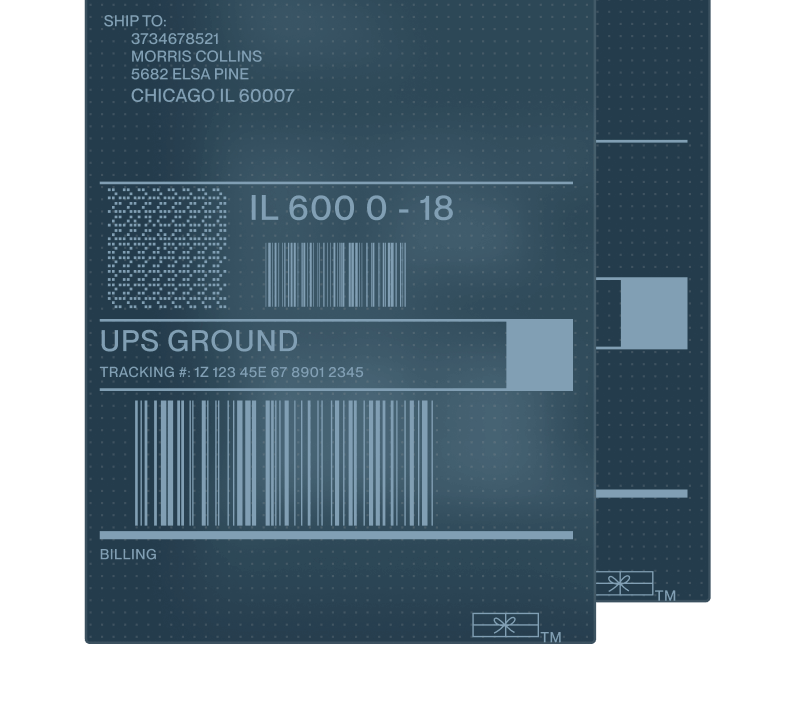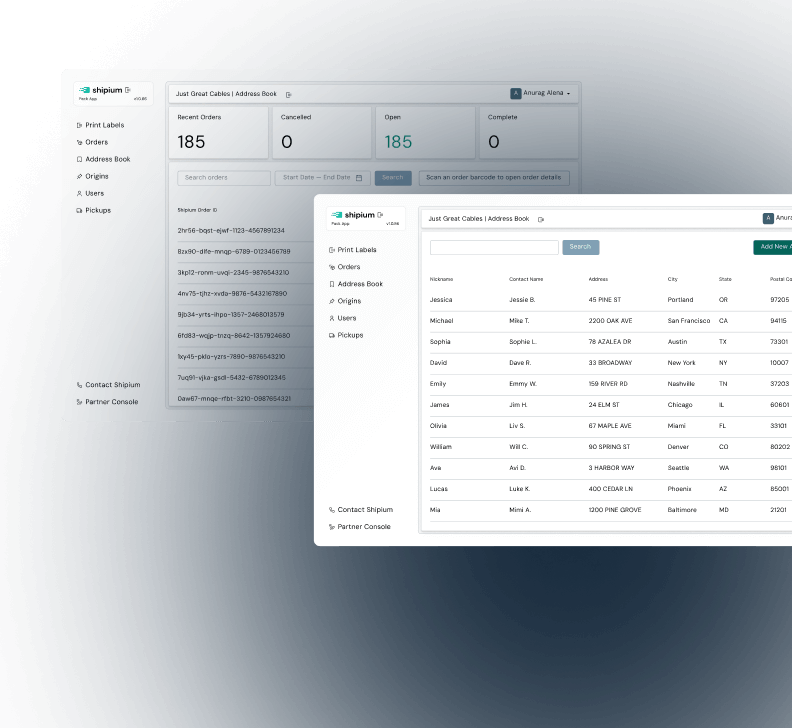Get insights in hours, not weeks
Quickly understand the impacts of operational changes you’re considering — whether it’s greater use of ground services, adding a carrier, or optimizing volume for discount tiers.

Optimize for your business goals
Drive continuous improvement by using data from executed shipments, Shipium’s platform-wide data, and industry-leading ML.
Improve strategic planning
Strategic planning should rely on data-driven insight, not assumptions. Test your hypotheses quickly and create faster, more iterative decision-making cycles.
Justify operational changes
Make a business case for network changes when simulation results meet your desired thresholds for performance improvement, cost reduction, or both.
End-to-End Shipping Platform
How Shipium Simulation takes you from what-if to what’s next
Between faster setup, intuitive insights, and guidance from our expert customer success team, here’s how we ensure that your simulations are a success.

Simple setup, fast execution
Provide us with your historical data and define your unique network properties like carriers, rates, origins, and volume limits. Then, apply your simulation constraints, run predictive scenarios, and get to answers quickly.
Change carriers and/or rates
Apply different delivery date constraints
Test new rule configurations
Adjust volume limits
Much, much more
We also offer templates for common simulations to further accelerate the process.

Easy consumption and analysis
Insights are presented using intuitive reports and data visualizations that make results easy to understand and act on.

Guidance from experts
Our team is here to help you through the process, having run dozens of simulations a quarter for enterprise customers. Assisted setup and use case guidance ensure that you get the outcomes you’re looking for.
Results you can trust
Built on AI + ML, not hype
Real data science has been at the core of what we do since the beginning — built on the same principles that revolutionized Amazon’s supply chain.

It starts with data
Predictions are only as good as the data that informs them. Shipium accounts for your historical data, combines it data sourced from 350+ million shipments, and accounts for real-world conditions like weather events and carrier bulletins.

Your network properties are represented
Models are trained to generate predictions based on your carriers, pull times, rates, origins, business rules and more.

Models for essential use cases
Shipium’s models are tailored to unique use cases like delivery promise presentation, origin selection, and optimal carrier selection — our data science team is also constantly testing new models to add to the platform.

Dedicated data science team
Our data science leaders and engineers bring deep expertise from places like MIT and Amazon, and apply that experience to solve real-world problems for shippers.
Use Cases

Intelligent Downgrades
See when cheaper service methods would have delivered just as fast (or faster)
Simulate executed shipments using non-guaranteed methods like FedEx or UPS Ground
View impacts to transit times and costs to meet your desired speed:cost ratio
Continuously reduce what it costs to hit promised delivery dates

Dynamic Volume Allocation
Balance contractual obligations with pure date + rate shopping
Analyze which shipments should be sent via a specific carrier to meet a commitment at the lowest cost
Rebalance volume when there are cost saving opportunities that still meet desired thresholds
Compare differences between pure cost-based rate shopping and rate shopping with minimum limit requirements

GRI Increases
Understand how upcoming rate increases will impact costs
Approach contract negotiations armed with your knowledge of expected cost increases by lane
Plan for volume shifts and changes to origin selection based on new cost structures

Faster Promise Dates
Know how more competitive promise dates would impact your costs
Present more competitive delivery dates to customers whenever they meet your desired cost threshold
Keep pace with (or beat) your competitors on delivery speed

Branded Shipping Options
3PL
Meet your promise dates at the lowest cost
Offer custom shipping options with SLAs and find the cheapest carrier and service that will meet them
Adjust SLAs when different transit times are predicted to drive better business outcomes
Case Study
How Simulation improved decision velocity for a Fortune 500 Retailer
Between faster setup, intuitive insights, and guidance from our expert customer success team, here’s how we ensure that your simulations are a success.
Simulation Categories
Volume Thresholds
Simulating which shipments should be sent via National Carrier to meet 80% commitment at the lowest cost.
Intelligent Downgrades
Simulating which shipments should be sent via National Carrier to meet 80% commitment at the lowest cost.
Simulation Categories
Simulating which shipments should be sent via National Carrier to meet 80% commitment at the lowest cost.
GRI Impact
Simulating which shipments should be sent via National Carrier to meet 80% commitment at the lowest cost.
ZIP/Zone Rule Efficacy
Simulating which shipments should be sent via National Carrier to meet 80% commitment at the lowest cost.
Carrier Network Expansion
Simulating which shipments should be sent via National Carrier to meet 80% commitment at the lowest cost.

Desired Outputs
Discount Tier Report
Downgrade Opportunity Report
GRI Cost Impact Analysis
Carrier Cost & Performance Reporting by Zone
Cost & Performance Reporting by Carrier
39
Simulations run in a single quarter to address desired scenarios
-$0.22
Early cost-per-package reduction based on results
$10+ Million
Projected savings in 2025 for warehouse origins alone
Complete strategy and planning support


















